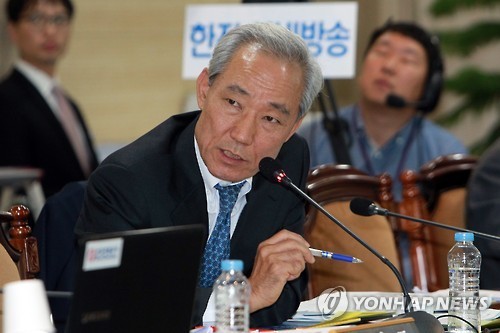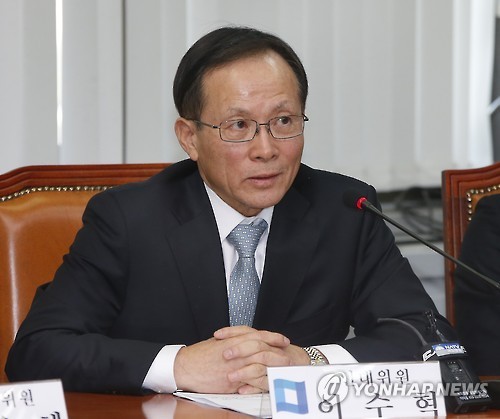As internal strife, partisan backbiting and economic debate take over election campaigns, all three major parties are failing to offer a clear vision for foreign and security policy as well as concrete legislative steps, despite North Korea’s evolving nuclear threats and other mounting diplomatic challenges.
With the decades-long territorial division, foreign affairs and security pledges had often best emitted each party’s ideological hue. The stark differences in their stances toward hotly debated topics like dialogue with Pyongyang, human rights in the oppressive state and how to achieve a future reunification used to define each party’s identification.
This time, however, both the ruling Saenuri Party and main opposition The Minjoo Party of Korea introduced packages that appeared rather colorless and lacking substance. The minor opposition People’s Party, which initially did not present any security commitments at all, released a five-point set of pledges last week.
Meanwhile, there have been many eye-catching — yet populist — pledges such as a cut in the length of the mandatory military service and a hike in soldiers’ salaries.
In a rare show of unison, the two leading parties set atop their agendas robust defense readiness against North Korea based on the South Korea-U.S. alliance, though detailed action plans vary.
To boost the South Korean military’s response capabilities, both sides reaffirmed support for plans to establish the Kill Chain and Korea Air and Missile Defense preemptive strike systems by the early 2020s, and to adopt more monitoring and reconnaissance assets. The People’s Party also displayed support for the KAMD project, but protested against the planned stationing of the U.S.’ Terminal High Altitude Area Defense system here, citing “astronomical” deployment costs relative to its effectiveness and the high possibility of diplomatic discord with China and Russia.
 |
| The Saenuri Party’s candidate for the Gangnam constituency, former Trade Minister Kim Jong-hoon. (Yonhap) |
On cross-border ties, the Saenuri Party has focused more on shoring up the government’s drive to ramp up pressure on Pyongyang to denuclearize, whereas the Minjoo Party has called for simultaneous efforts to defuse tensions and build confidence, such as through a joint military committee.
Saenuri Party also vowed to help improve the communist state’s grim living conditions, such as by formulating a basic framework on North Korean human rights in line with recently enacted legislation. The conservative party also laid out plans to revive exchanges between separated families, expand assistance to defectors and reinforce unification preparations through research, public events and education, among others.
The Minjoo Party is seeking to normalize the joint Gaeseong industrial park that was shut down in February following the North’s latest nuclear and missile tests, while pursuing a Korean-style “freikauf” model, the money-for-prisoner scheme used by the former West Germany, to bring more North Koreans into the South.
As part of its initiative for a “new economy on the Korean Peninsula,” the liberal party envisaged creating new joint economic zones in border regions and related organizations. It also aims to revitalize stalled inter-Korean business and people-to-people exchange programs including a tour to the Mount Geumgangsan and Mount Baekdusan resorts, Pyongyang and Gaeseong.
Lambasting the controversial settlement on the “comfort women” issue with Japan, the Minjoo Party pledged to reopen negotiations so as to “help the victims regain their honor and the people their pride.”
 |
| The Minjoo Party of Korea’s proportional representative candidate Lee Soo-hyuk, a former deputy foreign minister and chief nuclear negotiator. (Yonhap) |
The People’s Party, for its part, vowed to reopen the Gaeseong industrial complex, saying it does little to thwart Pyongyang’s nuclear and missile programs, but rather inflicts economic losses on the South Korean businesses and government. It also calls for a restart of the six-party denuclearization talks, the launch of four-way peace dialogue with the North, the U.S. and China, and the establishment of an economic cooperation zone covering parts of the two Koreas, northeastern China and Russia.
The parties are most evidently split over the counterterrorism act, which was passed early last month with the ruling party’s nearly unanimous endorsement despite a days-long, record-breaking filibuster by opposition lawmakers.
The Minjoo Party promised to push through a revision, saying the law carries “potential sources of human rights violations,” making way for the National Intelligence Service to step up spying activities on civilians and political maneuvering. In the longer term, the party seeks to abolish the scandal-ridden agency and launch an organization gathering intelligence on North Korea and from overseas.
The minor opposition People’s Party also sees an amendment as essential, though it acknowledges the fundamental need for such legislation, citing “unacceptable” concerns that it may “seriously damage the people’s basic rights.”
On compulsory military service, Saenuri is looking to allow student enlistees to take more online courses at barracks and receive credits for military training by the end of 2017. It also wants to gradually raise the daily compensation for reserve troops to 30,000 won ($26) through 2021 from the current 12,000 won.
The Minjoo Party has unveiled a more ambitious proposal, including shortening the service period by three months to 18 months and jacking up the monthly salary of soldiers on average 100,000 won, or up to 300,000 won step by step.
But the prospects for most of the promises remain bleak — similar ideas have been floated ahead of past elections, but few of them materialized due to budget shortfalls or other administrative setbacks.
Rather than touching on issues such as troop salaries or service length, the People’s Party simply introduced plans to overhaul the soldier management system and reinforce therapy and consultation programs to contain suicides and accidents within barracks.
“The Saenuri package falls short of addressing the pressing issues, especially with regard to North Korea, among others, as well as providing detailed rationales behind anticipated effects of its proposals and financing ideas,” the Korea Manifesto Center said in its analysis.
“Minjoo’s ‘new economy’ initiative was significant in presenting a peaceful resolution to an inter-Korean stalemate, which is the most pressing issue at hand.”
But to move forward with their plans, national consensus should build first, the nongovernmental organization noted, pointing to prevailing dampened sentiment at home and abroad toward any major business cooperation with a nuclear-armed, recalcitrant Pyongyang.
“A more scrupulous examination is also needed such as on the reasons why the exchange projects were frozen previously. Given the current cross-border situation and international resolutions, controversy could also arise as to the pledge’s timeliness and viability,” the center added.
“As for the People’s Party, it claims to stand for radical center in its creed, but its overall package did not place stress on security matters in favor of promoting fair distribution of wealth and new growth engines.”
The lack of weightage given to foreign and security policy in election promises is partly reflected in the absence of specialists at each party’s policymaking core, critics say.
Apart from some retired military generals mostly at Saenuri including Reps. Hwang Jin-ha and Kim Sung-chan, few experts in North Korea and foreign affairs and former government officials have been giving advice or secured nominations for the upcoming vote.
While former Trade Minister Kim Jong-hoon set sights on serving for another four years, first-term Saenuri member Rep. Shim Yoon-joe who was a deputy foreign minister was defeated in a primary. Kim Keun-sik, a North Korea expert at Kyungnam University and People’s Party hopeful, has dropped his bid in support of former Unification Minister Chung Dong-young.
The Minjoo Party’s specialist delegation is led by Lee Soo-hyuk, a former deputy foreign minister and chief nuclear negotiator who is forecast to enter the assembly with his 15th position in the party’s proportional representative list. Others include former unification minister adviser Rep. Hong Ihk-pyo and Ha Jung-yul, a retired one-star general and former head of the private Korea Institute for Security and Unification who is running in the Jeongeup and Gochang constituency in North Jeolla Province.
“It’s regretful that diplomacy and security were put on the back burner in the election pledges, while a very small number of experts and former policymakers in the fields made it to the proportional representation system or are giving policy advice at least,” a government official said, requesting anonymity.
“The economy should understandably be the top issue, but the current level of attention is very alarming, especially given that North Korea recently conducted its fourth nuclear test.”
By Shin Hyon-hee (heeshin@heraldcorp.com)

